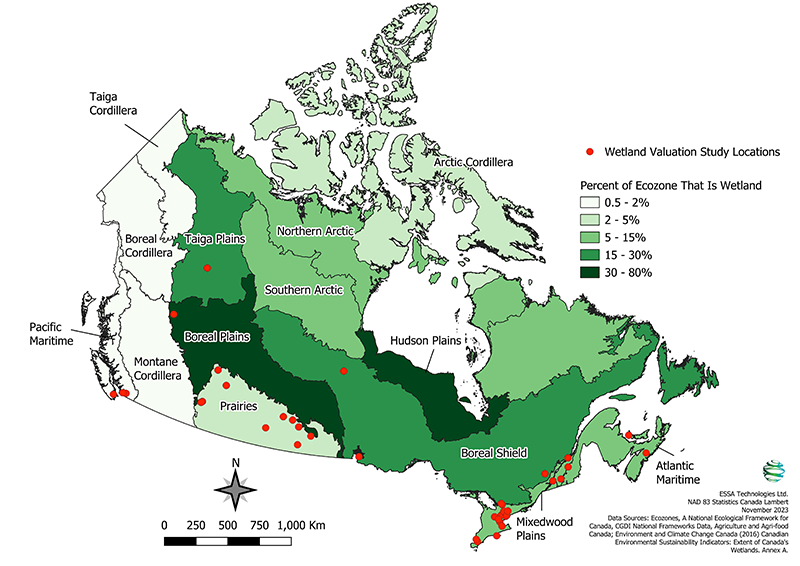Review and Gap Analysis of Canadian Wetland Ecosystem Services Valuation Studies
Photo credit: Dennis Jarvis, DSC_0301 – Sunrise along Highway 101, NS, Taken on October 18, 2008
Project Details
Location: |
Canada | |
Client: |
Canadian Wetlands Roundtable (via Ducks Unlimited) | |
Duration: |
September 2023 – November 2023 | |
Team Member(s): |
Cedar Morton, Alex Crew | |
Practice Area(s): |
Nature Based Solutions | |
Services Employed: |
Strategic planning and policy analysis, Science communication |
The Problem We Aimed to Solve
Given that Canada contains 25% of the world’s wetlands, spanning 129 million hectares, there is a need for a comprehensive understanding of the economic, social, and environmental benefits these wetlands provide. The Canadian Wetlands Roundtable (CWR) commissioned ESSA to evaluate the feasibility of using existing research to conduct a nationwide economic valuation of wetland ecosystem services.
How We Helped
We completed the study in four steps starting with the acquisition and review of wetland ecosystem service valuation studies, then extraction of relevant information and compilation in a database, completion of a gap analysis using the gathered information, and finally measurement of the robustness and scalability of wetland economic valuations to-date. Evaluation criteria included peer review, scientific validity, data quality, effort to triangulate results, number of study sites, scale of analysis, homogeneity of the ecosystem, and spatial consistency among others.
Our Project’s Impacts
With 45 studies covering 288 unique ecosystem service valuations, our study highlights the diverse benefits of Canadian wetlands. Most valuations to date (64%) have relied on secondary data, emphasizing the need for more primary data collection. Our gap analysis revealed geographic discrepancies in valuation efforts across the country, with the fewest wetland valuations done in Atlantic Canada and the northern Territories. We also highlight ecological gaps across Canadian ecozones, noting that ecozones with the lowest human populations and greatest wetland coverage have the fewest wetland valuations. Of the 5 wetland classifications we evaluated, fens are the most under-represented despite being the dominant wetland type in over half of the ecozones.
Our analysis of the robustness and scalability of different valuations showed that a national assessment of total economic value (TEV) will be difficult as there are many ecosystem services without robust and scalable valuation studies, but there are promising options available for a select set of ecosystem services including global climate regulation, water quality regulation, and recreation opportunities. Our recommendations suggest leveraging these studies as a first pass, then investing in more primary valuation research
-
Report not publicly available


